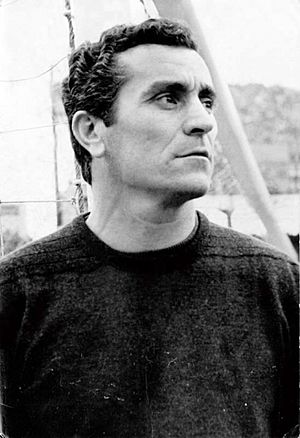Amadeo Carrizo facts for kids
 |
|||
| Personal information | |||
|---|---|---|---|
| Full name | Amadeo Raúl Carrizo Larretape | ||
| Date of birth | 12 June 1926 | ||
| Place of birth | Rufino, Argentina | ||
| Date of death | 20 March 2020 (aged 93) | ||
| Place of death | Buenos Aires, Argentina | ||
| Height | 1.88 m (6 ft 2 in) | ||
| Position(s) | Goalkeeper | ||
| Senior career* | |||
| Years | Team | Apps | (Gls) |
| 1945–1968 | River Plate | 521 | (0) |
| 1969 | Alianza Lima | 1 | (0) |
| 1969 | Club Universitario de Deportes | 1 | (0) |
| 1969–1970 | Millonarios | 53 | (0) |
| Total | 576 | (0) | |
| International career | |||
| 1954–1964 | Argentina | 20 | (0) |
| Managerial career | |||
| 1973 | Deportivo Armenio | ||
| 1973 | Once Caldas | ||
| *Club domestic league appearances and goals | |||
Amadeo Raúl Carrizo Larretape (born June 12, 1926 – died March 20, 2020) was a famous Argentine football goalkeeper and manager. People often called him "Amadeo." He was a true pioneer in the world of football. Amadeo changed how goalkeepers played the game.
He introduced new ways of playing and strategies for goalkeepers. In 1999, the IFFHS (a group that keeps football records) named him the best South American goalkeeper of the 20th century.
Contents
How Amadeo Changed Goalkeeping
Amadeo Carrizo brought many new ideas to football. He was the first goalkeeper in Argentina to wear gloves. He learned this from Italy's Giovanni Viola.
- He was also the first to regularly leave the penalty area. This helped him defend his goal better.
- Amadeo was the first to use goal kicks as a way to start quick attacks. This was a new tactic.
- His unique style inspired many famous South American goalkeepers. These include Hugo Orlando Gatti, René Higuita, and José Luis Chilavert.
- Even today, Germany's Manuel Neuer plays in a similar modern style.
Playing for River Plate
Amadeo Carrizo started his professional career in 1945. His first game was on May 6, 1945. He played for River Plate in the Argentine First Division. River Plate won that match 2–1 against Independiente.
During his time at River Plate, he played with many football legends. These included José Manuel Moreno, Félix Loustau, Adolfo Pedernera, Ángel Labruna, and a young Alfredo Di Stéfano.
He helped River Plate win many important titles:
- He won seven national championships. These were in 1945, 1947, 1952, 1953, 1955, 1956, and 1957.
- With River, he also won the Copa Aldao in 1945 and 1947.
- He won the Copa Ibarguren in 1952.
- In 1966, his team reached the 1966 Copa Libertadores Finals. They lost after three tough matches against CA Peñarol from Uruguay.
Playing for Argentina
Amadeo also played for the Argentina national football team. He had great success, especially in games against Brazil.
However, he was part of the team that lost 6–1 to Czechoslovakia in the 1958 FIFA World Cup. In 1964, he won the Taça das Nações with Argentina. This tournament was held in Brazil. It also featured England and Portugal. It celebrated the 50th anniversary of the Brazilian Football Confederation.
Records and Later Career
In 1968, Amadeo Carrizo set two amazing records for his time.
- He played 521 official matches for River Plate in the Argentine First Division. This was a record for the club.
- He also went 8 games in a row without letting in any goals. This meant he kept a clean sheet for 769 minutes!
In 1969, he played one match for two different Peruvian teams.
- He played for Alianza Lima against Lev Yashin's Dynamo Moscow.
- He also played for Club Universitario de Deportes against SC Corinthians Paulista from Brazil.
In April 1969, he joined the Colombian team Millonarios. He finished his playing career there in April 1970. His amazing, sometimes acrobatic, saves earned him a special nickname. Local fans called him "Tarzan."
Coaching Career
After retiring as a player, Amadeo Carrizo became a manager.
- In 1973, he managed Deportivo Armenio. This club is from the Province of Buenos Aires. He led the team to be promoted to a higher league, Primera C.
- Also in 1973, he returned to Colombia. He managed the first division team Once Caldas. This team was from Manizales and was known as Cristal Caldas at the time.
See also
 In Spanish: Amadeo Carrizo para niños
In Spanish: Amadeo Carrizo para niños
 | Leon Lynch |
 | Milton P. Webster |
 | Ferdinand Smith |

